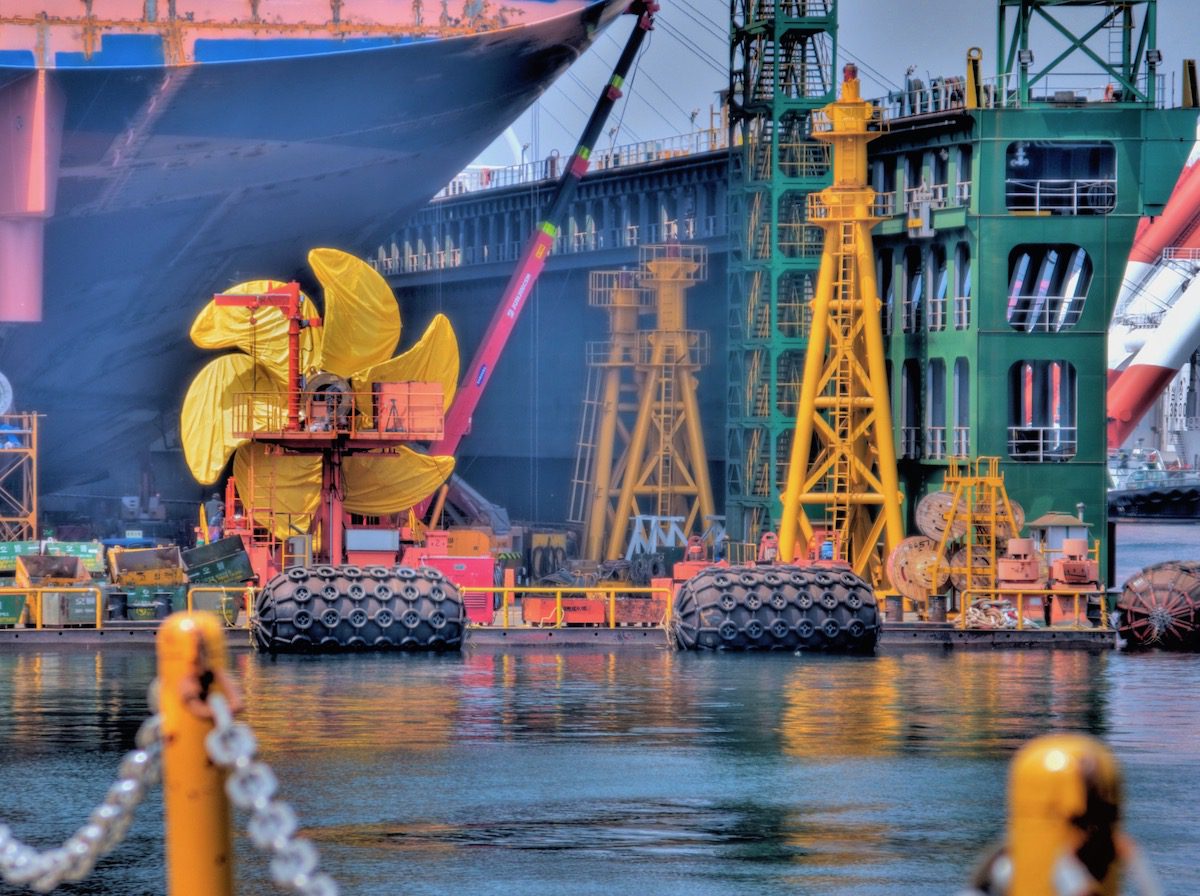Ship under construction at Samsung Heavy Industries. Photo: John Konrad
By Jung Park
(Bloomberg) — As if investors in Asia’s troubled corporate bond markets don’t have enough to worry about, concern is mounting about whether South Korean shipyards will be able to repay record amounts of debt coming due next year.
Yields on bonds of Daewoo Shipbuilding & Marine Engineering Co. and Samsung Heavy Industries Co. have shot up this year. The top four Korean shipbuilders have 2.3 trillion won ($1.9 billion) in notes maturing next year, the most in Bloomberg-compiled data going back to 1997. Some of them may have trouble paying debts without help from the government or group firms, according to HMC Investment Securities Co. and NH Investment & Securities Co.
The bond slump adds to jitters in Asia’s debt market, which has seen Chinese defaults climb to 28 this year from seven in 2015 and delinquencies spreading in Singapore as weak commodity markets took their toll. Hanjin Shipping Co. sought bankruptcy protection this year and earnings suffered at Korea’s top shipyards including Hyundai Heavy Industries Co. and Hyundai Mipo Dockyard Co., amid a slump in oil prices and growing competition from China.
“Real worries about shipbuilders’ debt will become more apparent next year as maturities approach,” said Kim Jin-young, a credit analyst at HMC Investment in Seoul. “Daewoo will need an additional lifeline from state banks, and companies like Samsung Heavy may need to get help from their group firms.”
The yield on Daewoo Shipbuilding’s three-year bond due April 2017 rose to a record 13.9 percent last month and it’s still at 12.4 percent compared with 8.4 percent a year earlier, Bloomberg-compiled prices show. Samsung Heavy’s five-year note due in February saw its yield jump to 3.3 percent last month from 2.6 percent in February.
Daewoo Shipbuilding is doing its best to secure enough liquidity for the bond payments and is in the process of selling non-essential assets including subsidiaries and real estate, said a spokesman who asked not to be identified. Samsung Heavy will have enough cash to meet obligations next year after a recent rights issue and because it expects to deliver an offshore facility in the first half, according to an official who declined to be named.
Daewoo Shipbuilding has 940 billion won in debt maturing next year, starting from April. Cash and cash equivalents stand at 739 billion won, while short-term borrowings total more than 5 trillion won, exchange filings show. The shipyard is expected to receive an additional $2.4 billion in capital from the state-run Korea Development Bank, its biggest shareholder, and the Export-Import Bank of Korea.
The capital infusion probably won’t be sufficient for Daewoo Shipbuilding to deal with its debt because revenue will likely fall next year, according to Lim Jung-min, a credit analyst at NH Investment. “It will probably need additional support,” Lim said.
Hyundai Heavy, Daewoo Shipbuilding and Samsung Heavy have all posted multiple quarters of losses in the past year-and-a-half amid delivery delays and a plunge in demand for new vessels and oil platforms.
“The credit quality of a lot of Korean firms, especially those that are sensitive to economic cycles such as shipyards, will deteriorate next year,” said Choi Jin-young, head of fixed income at Mirae Asset, which oversees 111 trillion won globally.
Hyundai Heavy’s shares dropped 0.3 percent to 148,500 won Friday in Seoul, while Samsung Heavy fell 0.5 percent to 9,430 won. The Kospi share index was flat. Daewoo Shipbuilding’s stock trading was halted in July.
Korea Ratings, a local affiliate of Fitch, cut the credit scores of all three shipyards in 2016 and has a negative outlook.
“We aren’t seeing a compelling breakthrough out of this slump,” said Kim Bong-kyun, an evaluation team manager at Korea Ratings. Shipping oversupply will persist and demand for offshore facilities will be weak unless crude recovers to $70 or $80, according to Kim.
© 2016 Bloomberg L.P

 Join The Club
Join The Club











